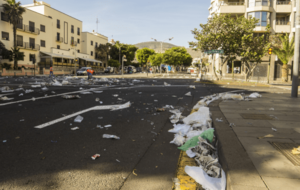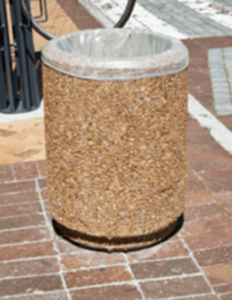StreetScape Concrete Bins: Litter in South Africa
Litter has become a pervasive problem in many South African urban spaces. StreetScape manufactures durable and stylish concrete bins suited to reducing litter problems in any urban space. Read through the effects of litter on South African urban spaces, see what difference you can make, and throw your unwanted items away in a StreetScape concrete bin.
StreetScape:
StreetScape is a manufacturer of landscaping elements. StreetScape is based in Cape Town and provides the Western Cape with all needed landscaping elements, such as bollards, planters, and concrete bins.
StreetScape creates functional landscaping elements which are useful and necessary in many urban spaces. Many of the landscaping elements created by StreetScape serve safety functions for pedestrians, motor vehicles, and businesses. StreetScape ensures that all manufactured landscaping elements fulfil their purpose to the highest standard.
StreetScape also aims to make spaces in South Africa more beautiful through functional landscaping elements which are stylish in design. Many of the StreetScape landscaping elements are available in various materials, sizes, and colours to add a unique touch to any urban space.
Alongside functionality and aesthetic designs, StreetScape creates affordable landscaping elements. We provide high-quality landscaping elements suited to a wide range of budgets so that anyone can enjoy StreetScape landscaping elements.
Concrete Bins:
Bins are important for urban spaces due to the high volume of people who need to discard unwanted items regularly. Bins need to be easily accessible, high-quality, and durable to suit an urban space. StreetScape produces concrete bins which are ideal for urban settings.
Concrete is a highly durable and strong material which means all concrete bins will have longevity in outdoor settings. This is important as all urban bins will be generally situated outside businesses, shopping centres, along beaches, and on sidewalks. All these areas are affected by the weather which makes StreetScape concrete bins a great choice for these spaces.
StreetScape concrete bins are an investment for any outdoor space. The durability means that you will not have to constantly replace the concrete bins in urban spaces. All the StreetScape concrete bins are over ninety-seven kilograms which makes them difficult to remove ensuring you will not have to replace the bins often.
The StreetScape concrete bins all have an exposed aggregate finish. The exposed aggregate adds an interesting textual appeal to the concrete bins. The various exposed aggregates come in different sizes and colours which makes it easy to find StreetScape concrete bins which will work in any urban space.
StreetScape offers six different types of concrete bins. The various types of StreetScape concrete bins are suited to a various range of disposable items.
- Round 500.
- Round Bin with Dome Canopy.
- Round Bin with Letterbox Canopy.
- Square 400.
- Pyramid Ash Bin.
- Square Ash Bin.

Litter in South Africa:
Urban spaces are bustling with people who are shopping, eating, working, and enjoying the many activities which urban spaces offer. At some point in a trip to an urban space, there will be items that need to be thrown away. Throwing unwanted items away in one of StreetScape concrete bins is what should be happening in urban spaces.
Unfortunately, many South African urban spaces are covered in litter. Litter refers to discarded items, such as empty cans, packets, food items, and so much more, which have ended up outside the bin and are polluting the urban space.

Effects of Litter:
Littering is a singular action that becomes a collective burden. We have listed the top four effects that litter has on South African urban spaces.
1) Eyesore:
On the surface level, litter transforms the uniquely South African urban spaces into degraded and unappealing areas. Piles of dirty litter are unsightly and drop the overall value of the urban space. This can have negative effects on businesses that operate in populated urban spaces as people will be less inclined to visit these littered areas.
2) Disease Transmission:
Litter can have far-reaching effects on the health of people who live or work in South African urban spaces.
Piles of litter can be breeding grounds for diseases. Discarded tyres, containers, and piled litter can cause pools of water to form. These pools of water are perfect places for diseases to form and then spread as the water seeps into nearby areas.
Piles of litter can also hide littered medical waste items. People who by mistake walk over litter can run the risk of standing on medical waste items, such as discarded needles, and risk transmission of diseases.
Children who are left unattended around litter also risk being infected with diseases if they consume dirty litter or get cut on sharp discarded items.
Litter can also be the perfect breeding place for rats in urban spaces. Rats often carry harmful diseases and spread these diseases widely.
The litter which ends up in nearby water sources can also pollute and contaminate the water. People who are dependent on these water sources near urban areas are then at risk of falling ill.
3) Effects on Animals:
Urban spaces are filled with pets, birds, and other small wildlife. These animals can then ingest the litter which is floating around and suffer painful deaths. Alongside ingesting, animals can be trapped, suffocated, strangled, and poisoned by litter that degrades the urban spaces.
4) Environmental Effects:
There are numerous environmental effects that litter can cause on a local and wider scale. We focus on the environmental effects litter has on the water in and around urban spaces.
Litter often ends up in stormwater drains and is then flushed out into the ocean. Our oceans are becoming increasingly polluted with plastic waste which is having far-reaching effects on marine life.
The pollution of our oceans does not only refer to the plastic we can see bobbing in the waves or the stomachs of sharks. Microplastics end up in the ocean which is then consumed by the fish we then feed to our families. We are consuming small quantities of the plastic we are polluting our oceans with.
If the litter builds up in the stormwater drains, then there is the possibility of flooding in urban spaces. This puts many lives, vehicles, and buildings at risk. Flooding can cause far-reaching environmental damages, such as spreading polluted water into nearby rivers and water sources.

5) Economic Effects:
Litter places an increased burden on urban municipalities. There are increased costs for the municipality as more people will need to be hired to clean the urban spaces. Removing certain items, such as batteries and medical waste, also requires specific methods which can be costly for the municipality to organise.
The littering of cigarette butts is often a cause of wildfires. South Africa is a country that is seasonally prone to wildfires and the increase in fires caused by discarded lit cigarette butts further burdens our fire departments. A fire in an urban space is highly dangerous due to the high population of people and businesses in these areas.
How You Can Make a Difference:
We have listed some quick tips which can easily be integrated into anyone’s lifestyle to help reduce the amount of litter in South African urban spaces.
1) Change Your Habits:
One way to avoid littering is to have fewer items to drop onto the floor. Skip the morning takeaway coffee, carry a refillable water bottle around with you, and pack a lunch for work to avoid having to purchase single-use items which are thrown away immediately.
Attempting to reduce the amount of waste you create is a step towards reducing litter in the greater urban spaces. Plus, both you and your bank account win with this one.
2) Set an Example:
Throwing your unwanted items away in a bin in an urban space helps set an example. Urban spaces are full of people and you will be noticed as you march confidently, unwanted item in hand, and thrust it into the bin.

3) Educate Those Around You:
You and your friends have hit the city for a shopping spree. You walk three abreast down the sidewalk, your hair blowing in the breeze, and are sipping on take-away ice-coffees. You notice your one friend has finished her drink, and as she is laughing at a joke, drops the empty plastic cup to the floor.
This is where you put your heels to the ground, point out your friend’s action, and ask politely for them to pick it up and throw it away in a bin. Like how bystanders are just as bad as the bully, bystanders to littering are part of the problem. Educate your friends and family on the importance of using bins to keep urban spaces clean, safe, and beautiful.
4) Hold onto The Item Until You Are Home:
Urban spaces are popular areas for flyer advertising. You will often come across eager marketers who will thrust a flyer denoting a tyre or restaurant special into your hand as you walk. You know that you should not just drop the unwanted flyer to the ground, but sometimes you cannot find a nearby bin.
If there are no concrete bins nearby, we suggest holding onto the unwanted flyer or any other item which you want to discard until you are home. When you are home you can then throw the item away with a clear conscience that you have not littered in your nearby urban space.
5) Recycle:
Litter is often made up of items that can be easily recycled. Instead of being transformed into a new product, the littered items clog up stormwater drains, dangle from trees, and pile up alongside the road. Placing all unwanted items into concrete bins makes it easier for South African municipalities to organise the rubbish accordingly and recycle certain items.
The next best step is to take your unwanted items home, clean them, and then pop them into an orange plastic bag and leave them on your kerb on the day your municipality collects recycling. This helps speed up the process and ensures your recyclable items arrive at the recycling organisations.
Recycling reduces litter as it reduces the unnecessary amount of waste products that end up on the side of the roads or blowing out of bins. This is a list of items which you should not by throwing into a rubbish bin but into an orange recycling bag.
- Paper.
- Cardboard.
- Cans.
- Glass.
- Plastic.

6) Invest in Your Community:
If you are passionate about bettering your urban spaces, then consider supplying concrete bins to areas without any. Often the main cause of litter is the lack of facilities to discard unwanted items. Create initiatives for people to get involved in to raise awareness around litter and raise funds to buy bins for your nearby urban spaces.

Reduce litter in urban spaces and throw unwanted items away in StreetScape concrete bins.

